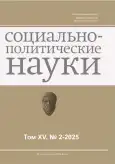BRICS, SCO and EAEU Integration in context of formation of multipolar world
- Authors: Volkov A.P.1, Shangaraev R.N.1
-
Affiliations:
- Diplomatic Academy of the Ministry of Foreign Affairs of the Russian Federation
- Issue: Vol 15, No 2 (2025)
- Pages: 153-163
- Section: National Security of Russia
- URL: https://journal-vniispk.ru/2223-0092/article/view/296097
- DOI: https://doi.org/10.33693/2223-0092-2025-15-2-153-163
- EDN: https://elibrary.ru/NVKPMF
- ID: 296097
Cite item
Abstract
The purpose of the research. The article discusses changes in world politics associated with the strengthening of the role of new international organizations and structures, such as BRICS and the Shanghai Cooperation Organization (SCO). These organizations are becoming key elements of the emerging multipolar system of international relations, offering alternative approaches to solving global problems and contributing to the strengthening of cooperation between the countries of the Global South and the East. Particular attention is paid to Russia’s active participation in these structures, which emphasizes its importance in the formation of a new world order. The results of the XVI BRICS Summit in Kazan, the prospects for the integration of the Eurasian Economic Union (EAEU) with BRICS and the SCO, as well as the challenges associated with the implementation of these ambitious goals are analyzed. The article also discusses the role of Asia in the new world order and the impact of the decisions of individual countries, such as Kazakhstan, on integration processes. Results. As a result of the conducted research, the authors come to the conclusion that BRICS and SCO are becoming key elements of the emerging multipolar system of international relations. The associations offer an alternative approach to solving international problems based on the principle of inclusiveness, justice and equality in international affairs. Russia initiates new ideas and projects, playing a key role in the development of such associations as BRICS, SCO and EAEU. The economic potential of the integration of the countries of the Global South is increasing. However, there are new challenges and threats that the member countries of the BRICS, EAEU and SCO associations face on their way to integration. Nevertheless, Asia, due to its demographic, economic, and technological advantages, is becoming the center of a new world order. The authors also highlighted further prospects for expanding integration processes both in the BRICS, SCO, and EAEU spaces, as well as between the member states of these associations. Research methodology. This study uses an integrated approach combining several methods to analyze the prospects for the integration of BRICS, SCO and EAEU in the context of the formation of a multipolar world: analysis of literature and documents, review of existing research; analysis of the regulatory framework; assessment of trade and economic indicators, assessment of the dynamics of trade turnover, investments and other economic indicators characterizing the interaction between the BRICS, SCO and EAEU member countries; comparison of macroeconomic indicators to assess the effectiveness of integration processes; content analysis of events and events, summits and meetings; study of the content of bilateral meetings of the leaders of the participating countries to determine priority areas of interaction. The work also uses expert assessments and opinions, as well as predictive analysis, trend extrapolation, and scenario analysis.
Keywords
Full Text
##article.viewOnOriginalSite##About the authors
Artem P. Volkov
Diplomatic Academy of the Ministry of Foreign Affairs of the Russian Federation
Author for correspondence.
Email: bayr03@bk.ru
ORCID iD: 0009-0002-3638-8812
SPIN-code: 1086-6616
applicant, Federal Customs Service of the Russian Federation, Sheremetyevo Customs
Russian Federation, Moscow
Ruslan N. Shangaraev
Diplomatic Academy of the Ministry of Foreign Affairs of the Russian Federation
Email: r.shangaraev@dipacademy.ru
ORCID iD: 0000-0001-6557-4388
SPIN-code: 2180-0229
Dr. Sci. (Polit.), Cand. Sci. (Econ.), Associate Professor; Professor, Department of Strategic Communications and Public Administration
Russian Federation, MoscowReferences
- Karpovich O.G. Democracy and democratization in the context of the new world order. Politics and Society. 2013. No. 8 (104). Pp. 1012–1020. (In Rus.)
- Karpovich O.G. Prospects of cooperation between Russia and Latin American countries. Russian Journal of Management. 2019. Vol. 7. No. 2. Pp. 26–30. (In Rus.)
- Karpovich O.G. Modern concepts and models of international conflict management (comparative political analysis). National security / Nota Bene. 2013. No. 4 (27). Pp. 605–612. (In Rus.)
- Konarovsky M.A. The SCO and BRICS: Opportunities and prospects for integration. 2019. URL: https://cyberleninka.ru/article/n/shos-i-briks-vozmozhnosti-i-perspektivy-sopryazheniya/viewer (data of accesses: 06.03.2025).
- Nogmov A.M., Shangaraev R.N. The role of regional integration associations in ensuring stability and security in Central Asian countries. The Diplomatic Service. 2018. No. 3. Pp. 48–54. (In Rus.)
- Pilshchikov Yu.S. Financial relations of the BRICS countries: state and prospects // Journal of Regional Economics and Management. 2017. URL: https://eee-region.ru/article/4942 / (data of accesses: 06.03.2025).
- Baranov V.P., Bartosh A.A., Bocharnikov I.V. et al. The Ukrainian crisis in the context of the transformation of the modern world order: development trends, threats and challenges for Russia. 2nd ed., rev. Moscow: Ekon-Inform Publishing House, 2022. 210 p.
- Shangaraev R.N. Strategic interests of Russian-Chinese cooperation and issues of national security in the framework of the SCO development. In: SCO: Opportunities and prospects. Materials of the international conference. 2016. Pp. 129–140.
- Shangaraev R.N. Formation of cluster structures in modern economics. Horizons of Economics. 2011. No. 2. Pp. 71–72. (In Rus.)
Supplementary files








